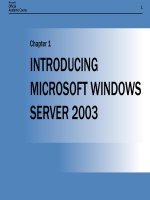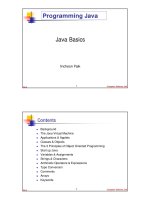SHRM chap01
Bạn đang xem bản rút gọn của tài liệu. Xem và tải ngay bản đầy đủ của tài liệu tại đây (255.23 KB, 13 trang )
CHAPTER 1
Theories, issues and influences in
human resource management
Session objectives
Define the purposes and scope of human
resource management (HRM) in Australia
Trace the development of HRM in Australia
Understand the influences, issues and
underlying theories of HRM
Assess the relevance of critiques of HRM
Describe the principal roles, functions and
outcomes of Australian HRM
Discuss the professional and ethical
principles guiding HRM
Personnel management vs
human resource management
Personnel management:
A set of functions or activities
Human resource management:
An integrated set of personnel activities,
linked strategically with organisational
objectives
History and origins of HRM
HRM has existed since the beginning of
time
Developed formally as a result of the
Industrial Revolution
Working conditions became a social and
industrial issue
Growth of trade unions and IR systems
Management theories and influences on HRM
Classical
management
theory
Classical
organisation
theory
Contingency
approaches
Excellence
studies
Behavioural
school
Transitional
theorists
HRM
TQM
Systems
theorists
Management
science
Stages in the development of HRM
Welfare and administration (1900–
1940s)
Staffing and training (1940s–mid-1970s)
Human resource management (mid1970s–1990s)
Strategic and global HRM (2000 and
beyond)
Concepts and models
Harvard model
‘Hard’ and ‘soft’ HRM
Unitarist and pluralist
perspectives
Relationship of HRM to IR
Criticisms of HRM theory
HRM – roles, functions and strategies
Strategic
Operational
Functional
Strategic HRM
Responsiveness to competition and
globalisation
Alignment to business strategy
Quality HRM practices
Management of change
HRM issues
Quantity and quality of employees
Strategic recruitment and selection
practices
Retention
Productivity and motivation
Job design
Integration and accountability of functions
Evaluation
HRM – the future
Devolution
Automation
Outsourcing









